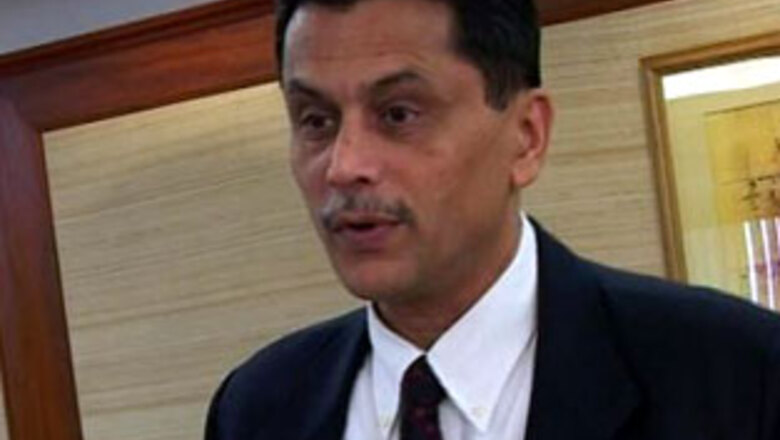
views
In the history of India's capital markets, rarely has one seen a year such as the last 12 months: we have had a meltdown, extreme volatility, we had a mutual fund industry that almost collapsed and also India's biggest corporate scandal - Satyam. The one person who steered the market through all of this, CB Bhave, the chairman of the Securities Exchange Board of India (Sebi), speaks to CNBC-TV18's Vivek Law in an exclusive interview.
Bhave said the foreign institutional investor (FII) procedure has been simplified by the market regulator. On the issue of money flow, he added that there was yet no uniform message from the FIIs on the India investment outlook.
"We have come a long way yet there are gaps that need to be filled," he said, pointing out that the quality of the investigations and orders of the market regulator could be improved.
"I don't think whether it is fair to say that Sebi is only a regulator that only barks and doesn't bite. But if that is the perception then it is our job to correct it. We would make all efforts to see that the quality of investigation and the quality of orders in Sebi is constantly improved," Bhave said. "There was some amount of perception or criticism if you will that the orders emanating from Sebi need to be better. We have to taken note of that criticism; we have tried to expose our officers to training by people who are experts in this area."
Here is a verbatim transcript of CB Bhave's exclusive interview on CNBC-TV18. Also watch the accompanying video.
Q: The day you took charge, I let out a secret about you which is how you took influence from Mahatma Gandhi: one of the things which he espoused about was persistence. You still look very relaxed despite these twelve months of fairly turbulent times, how do you manage that?
A: When you are in the field of public service field, people automatically learn to deal with the rough and the smooth because in public service such things do happen. The key is to do your best and then forget about it so that you get some time to relax.
Q: Since the last months that you have been heading Sebi have perhaps been one turbulence after the other you hardly had time to relax at all, but what about FIIs? One of the things, which you have been talking about is the fact that you would like to reform the whole process of their ability to come in and exit in a simpler manner. What is the progress on reforms as far as FIIs are concerned?
A: The procedure has been fairly simplified and it started sometime in October 2007 and we have seen a lot of FII and some account applications coming to Sebi and FIIs getting registered. Interestingly, all through the period when the markets were down and there was a lot of uncertainty in the market we saw that FIIs were still coming and registering here. At that time, the flows were negative, of course, but in March and April I have seen some positive flows in the market and this is a market phenomenon that will continue.
PAGE_BREAK
Q: Do you think that your conversations with some of these FIIs when they visit you and when they take part in global fora but what are they telling you, are they excited again about India, are they wanting to come back here and put in money, are you picking up that message?
A: I think we don't still seem to get a uniform message. The October-December was a period when FIIs were facing extreme redemption pressure, de-leveraging where people had taken leveraged positions. It appears that that pressure has gone down or reduced substantially but the the negative pressure is intact. One tends to group FIIs as one homogenous group but this is the point we have made earlier as well - that even in those worst months, there were FIIs, which were buying and sales were higher than the buys and even in today's market there are FIIs, which are selling but the purchases are more than the sales.
Q: Are you seeing long-term money into FIIs. Is it long-term money which is currently flowing in or is it again the hedge funds?
A: It's a little difficult to categorize that but when the market was down and uncertainty prevailed you could almost with great degree of certainty say that the money that was coming in at that time that is the FIIs which were buying were taking the long-term view of the market.
Q: Has the picture changed today?
A: It's a little different and the situation continues to be uncertain today.
Q: The other issue was the short-selling issue, the ban on short selling. International regulators talked about it, there was huge demand here in India from various corporate groups to say that this must be done, you stuck your neck out and said I am not going to do it. Was that a period where you had to take a big call because you had a situation when the market was falling and how do you revisit that whole thing today if you were to look back?
A: The point we were making at that time probably didn't get understood fully because whenever there is a situation like that, people categorize you into two compartments, which is for and against. The opportunity to sell short in India in the equity market that is the cash market is extremely limited because you have a T+2 settlement and the strict enforcement of the fact that if somebody were not to produce the shares which he has not yet sold, his positioned would be auctioned off. So that short selling didn't mean much, add to that the fact that institutions were not allowed to short sell unless they had participated in the lending-borrowing window opened by the stock market and had borrowed shares there. So short selling like the other jurisdictions may have perceived as a problem didn't exist in India as a problem.
PAGE_BREAK
Q: Let us move on to the mutual fund industry? You have for a very long time infact in your first interaction with the industry shortly after you had taken over- you had send out a clear message saying that it is high time the industry started focusing on the retail investor. It has been largely obsessed with the corporate investor in this country. I do not think much has happened on that front and do you think that the reason that we found ourselves in a situation where this industry almost went vilely up and with it could have almost taken the financial sector down was largely a result of the fact that the Indian mutual fund industry still continues to be obsessed which is chasing corporate money?
A: Corporate money or individual money doesn't really make a difference. It is money after all for the fund manager but the temptation to go after corporate money probably come of the fact that one can then boost of a very high value of assets and management. That of course has its own risk because if you have a few investors with large amount of money there and if those few investors are hit by the same phenomena then they will all tend to withdraw at the same time.
The kind of extreme conditions that existed in October the mutual funds found that even the good assets that they held the so called good assets even for those there were no market. So I think it was a combination of factors but certainly the fact that large amount of corporate money was there in those schemes did influence the fact that they got into difficulty.
Q: Sebi has put out a paper on variable load factor basically allowing the investor to know what is the extent of commission that the investor is paying. You met with a large amount of resistance, most of the industry players are up in the arms - are you convinced that this is something in whatever dose that you finally decide and whatever is the decision you finally make of course your board will make but are you convinced that this is something that this is high time that happens that an investor must know, they must be more transparency in that sector?
A: Fundamentally it is more than just investor knowing, it is the ability of the investor to decide - What is the price he wants to pay for the advice that he is getting. Certificately, a distributor gets paid for being the distributor of the scheme so the scheme pay him for the sales and marketing effort that he makes and he gets paid by the investor because he is giving advice to the investor on where to invest. If the investor is not the master of what or how much he would pay for the advice he is getting then there is a possibility that the investor may get advice that he did not want.
I think we have to place the decision making power in the hands of the entity that is paying. It was this idea with which we have put up the paper to write that there is a lot of representations that we have received against the change. Some of it may emanate from the fact that people resist change. It is natural human reaction. Our board will take cognizance of all this and then a decision will be made.
PAGE_BREAK
Q: Let's move to the enforcement side. There has been a spate of orders against some very strong entities, of various nature, whether it is insider trading, under the Fraudulent and Unfair Trade Practices, whether it is failure to disclose, across the spectrum, with absolutely no sense of we are not going to stop short. Sebi's perception has been largely of a regulator that barks and doesn't bite. Are you sending out a clear message to players in the market, to companies that this is a regulator that is no longer barking and it is going to bite?
A: I don't think whether it is fair to say that Sebi is only a regulator that only barks and doesn't bite. But if that is the perception then it is our job to correct it. We would make all efforts to see that the quality of investigation and the quality of orders in Sebi is constantly improved. There was some amount of perception or criticism if you will that the orders emanating from Sebi need to be better. We have to taken note of that criticism; we have tried to expose our officers to training by people who are experts in this area.
Q: So, this is a regulator that is going to bite?
A: If the Act has given us those powers then it is our duty to bite.
Q: Are you satisfied with the quality of disclosures, the desire to disclose among corporate India?
A: As I said, this whole of transparencies approach is not an event or a one-time phenomenon. If we really look at how far corporate disclosures have come in India in the last 10 years, then clearly we have come a long way.
That mustn't satisfy us or lull us into the feeling that we have arrived. Obviously there are a lot of gaps that need to be filled. One of the things that Sebi is looking at is whether it is possible for us to make sure that the corporate data that is filed is made available to the public and put out in the public domain. We had the Electronic Data Information Filing And Retrieval System (EDIFAR), which didn't go very far. We are trying to see what went wrong with it.
Q: Could you explain that a little more when you say corporate data?
A: Corporates are required to file apart from their quarterly results, many announcements from time to time with the stock exchanges. Stock exchanges typically what they are doing is that they are re-organising this data and putting it out in the form in which they think is most suitable or easy for investors.
I am looking at it from a slightly different point of view. I am saying, can the raw data itself, as it is filed by the corporates be made available, because the analyst community, data vendors, researchers would find the raw data most valuable because they can they can work around it the way they want.
Q: In fact the US Securities and Exchange Commission (SEC) mandates that even a conference call that you have with analysts, transcripts of that should be put up immediately on the company's website. Are you looking at those kinds of disclosures now?
A: There are jurisdictions that are way ahead of us. But I feel that if we are able to build this fundamental piece, then we can add on to it.
Q: We have a situation here that even if a company talks to an analyst or a broking outfit, it is not even supposed to disclose to the rest of the market whereas normally anything that is price sensitive should be disclosed?
A: There are issues as I said. We have come some distance. We need to still go a long way.
Q: Moving to Satyam, we have now seen a CBI chargesheet into the whole scam, we have seen a Serious Fraud Investigation Office (SFIO) report about the key findings of what they found. We don't know much about Sebi's investigation yet. What I would like to ask you is that four months from the time that he made his confession, are we any clearer today about whether money was siphoned off or whether it was purely fictitious money that was disclosed improperly to the market?
A: Our policy is that we do not speak about cases under investigation at any stage prior to an actual order being passed. So, only when Sebi passes an order, it will be put out in the public domain.
We obviously haven't passed an order except the first order ordering investigation in the Satyam case. That is why there is nothing in the public domain. All I can tell you is that we are progressing and we are trying our best to conclude this matter as early as we can.
Q: Are the investigations over? Are you still in the process? Right now is the process about passing an order as and when you do?
A: I wouldn't really want to classify it as investigation over and process on. I think we should wait for the order to be passed when it comes into the public domain. It will share a lot of light on what has been going on.
Q: One of the things you did post the Satyam scandal at a more systemic level was the whole peer review that you ordered. How is that progressing? We haven't heard much of it since the time it was announced. How would you like to assess it at this point? Is it working?
A: The process is very much working. But it would be fair to say that we had underestimated the time it would take us to complete the process. It has taken longer than what we had estimated because we have to make sure that there were no conflicts of interest between the auditing firm that was supposed to do the review vis-à-vis the auditing firm that had audited the accounts as well as the company, whose accounts had been audited.
So, it became a kind of triangular verification. That took a bit of time. But my latest information is that a fair bit of peer review work has been accomplished. The rest of the work is in progress and it should be possible for us at the end of this process to review as to what did we achieve out of this?
My disappointment is that people want to either condemn or declare this process as success prematurely. I think we should wait for the results.
PAGE_BREAK
Q: What's has been the biggest learning for you out of this whole Satyam episode, was it a disclosure failure, fraud cannot be prevented world over even if we have best laws and best enforcement, what has been according to you the 2-3 biggest learning's out of this episode?
A: One of the things we identified and taken action is the fact that this whole issue of promoters pledging their shares and then institutions selling them off, so this institution is available to the promoters that there is a danger that the promoters will sell off their shares and it may lose control of their company but it's not available to the other shareholders had to be corrected, this information had to reach the other shareholders and that is the step that we have taken. There are more learnings that will come out of this but I would much rather wait for entire process to get completed in order to figure out where exactly did things go wrong and whether there is a systemic solution to them.
Q: In case of Pyramid Saimira one of the big things that has emerged out of it which Sebi never went down that path was the role of the ability of certain person or entity who has been charged in the order to manipulate through the media, what is that message that you would like to send out to the media at this point of time is that by allowing yourself to be able to be manipulated as a vehicle, you are violating the law as much as other regulator may be doing?
A: In all situations where the law is broken and a crime is committed in a fairly complicated manner you will have two kinds of people who may appear to be part of chain that enabled the crime and one has to make a distinction between unsuspecting participants and people who willingly participated knowing that this is a fraudulent scheme. Our effort will be that the message is no different for the media; it is the same where all citizens of the country are supposed to follow the law and if we don't then the same amount of consequences visit us irrespective of where we are placed.
Q: Do you believe in the principle of self regulation?
A: Typically if organisations or group of people go in for self regulation, what they are doing is that in their own self interest, they are trying to create behavior amongst their set of employees and their set of people that will not be at odds with the law and self regulation is always a good thing and if media comes forward and wants to do this self regulation that will be ideal because one has to be careful about curbs and media as citizens to the countries they are subjected to same laws as anybody else.




















Comments
0 comment